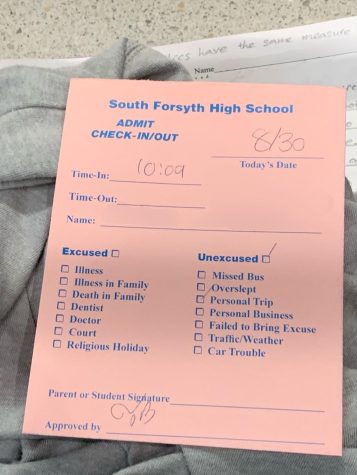Make Way for ‘The War Eagle Way’: It’s More Necessary Than You Think
The ‘War Eagle Way’ may seem frustrating – but it’s nothing compared to the frustration of being unprepared for adult life.
Introducing the War Eagle Way! South Forsyth High School initiates a new policy to help students stay engaged in the classroom and to encourage being on time. The new disciplinary system saw a reduction of tardies and phone usage at South.
September 17, 2022
I took in the afternoon sunshine as I sat down beside a wall near the Arena for lunch.
“Isn’t it nice?” my friend asks. “We didn’t get anything like this in middle school.”
That’s definitely true. There was no outdoor space, no sitting at various tables or with different people in the cafeteria and definitely no sitting outside in a picnic-like environment.
Compared to middle school, though, do we really get more freedom in high school?
I would like to think so. Sure, our phones are confiscated at the beginning of every class only to be returned before we leave. Sure, once the bell rings, every door is supposed to be locked. Sure, if you get four tardies, that means a detention straightaway.
South Forsyth’s new disciplinary framework—dubbed “the War Eagle Way”—has ruffled some feathers and sparked conversation amongst the student body about responsibility, professional behavior and freedoms versus punishment. The biggest question most students are asking is whether these new restrictions can be truly beneficial to their lives as students. Fewer are discussing how these behaviors might affect them later on in life.
Keep reading for an overview of the War Eagle Way and how it might actually apply outside the halls of South.
It’s called ‘the War Eagle Way’
South’s new disciplinary framework, the War Eagle Way, includes three main areas of behavior the school wants to emphasize and encourage: Lead, Achieve and Connect. The War Eagle Way invokes many principles such as being on time, staying engaged in the classroom and so on. The War Eagle Way also includes new cell phone and tardy policies that have sparked much discussion on campus.

Even if you usually never take your phone out of your bag, you’re most likely required to put it in a phone pocket holder or some other location far from you during certain classes. As for the tardy policy, three tardies warrant a phone call home; four tardies automatically earn you detention; five tardies result in a referral.
As students, these consequences for mismanaging our behavior may seem intense, but it’s nothing compared to the consequences of not learning how to adopt these behaviors before we enter adulthood.
A shocking number of adults get fired every year because of issues like lateness and disruptions from their phones.
According to the Perkins Asbill Professional Law Corporation, “41% [of employers] have fired an employee for showing up late.”
Getting detention now as a consequence of lateness is not as bad as losing a job, and therefore your source of income and insurance. If you get in the habit of being on time or even being early now, you won’t have to risk your job because of tardiness.
More Phones, More Problems
As for phones? Those devices that people carry around with them all day can definitely do harm. Too much of anything is bad for health, and addiction to anything is bad for life. Putting down your phone and paying attention to what’s happening around you is a great way to practice being involved and active, but there may be even more benefits to taking a technology break.
According to a study from Common Sense Media, a nonprofit organization that promotes technology and media safety for minors, “50% of teens ‘feel addicted’ to mobile devices.” The same report also found that 78% of teens check their devices at least once an hour, and 72% of teens feel pressure to respond immediately to a variety of notifications.
Consider, now, how these negative behaviors might impact you in adulthood: According to the Perkins Asbill Professional Law Corporation, “More than 20% of employees know or have worked with someone who has been fired for wasting time or disrupting other employees at the office.”
Furthermore, approximately a third of U.S. employers have penalized an employee for violating the corporation’s social media procedure, and “17% have fired an employee for something they posted on social media.”
Therefore, practicing rules that apply to the average adult now will only benefit you later in life. Not only will you be a remarkable student now, but you will be an exceptional employee in the future.
Great Freedom, Greater Responsibility
Back to the present, all these regulations and limitations may seem exasperating for a high schooler who may despise boundaries, but they are helping us to become more prepared for life. High school brings us closer to adulthood than we think. That’s why we have these regulations, but that’s also why we have these extra freedoms during lunch that allow us to sit with our friends from other grades, in the cafeteria or outside.
If you find yourself frustrated while practicing the War Eagle Way, just remember the old saying: “With great freedom comes great responsibility.”





